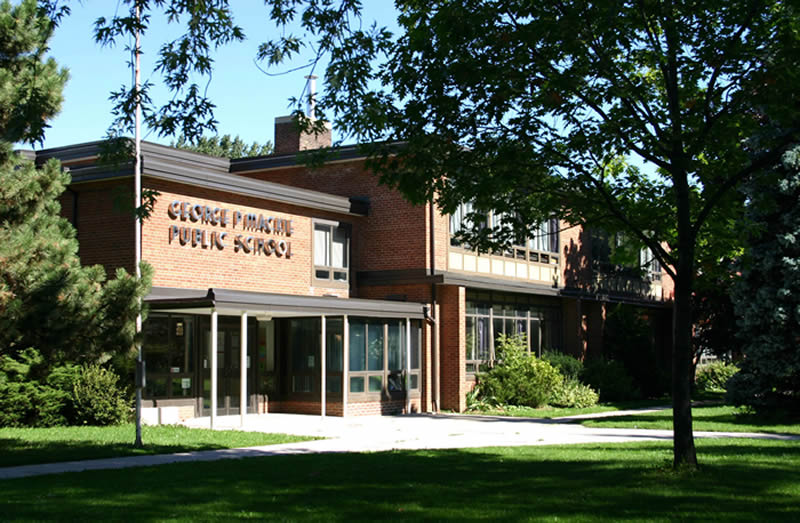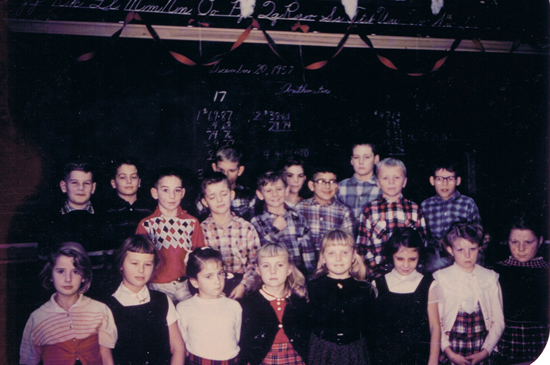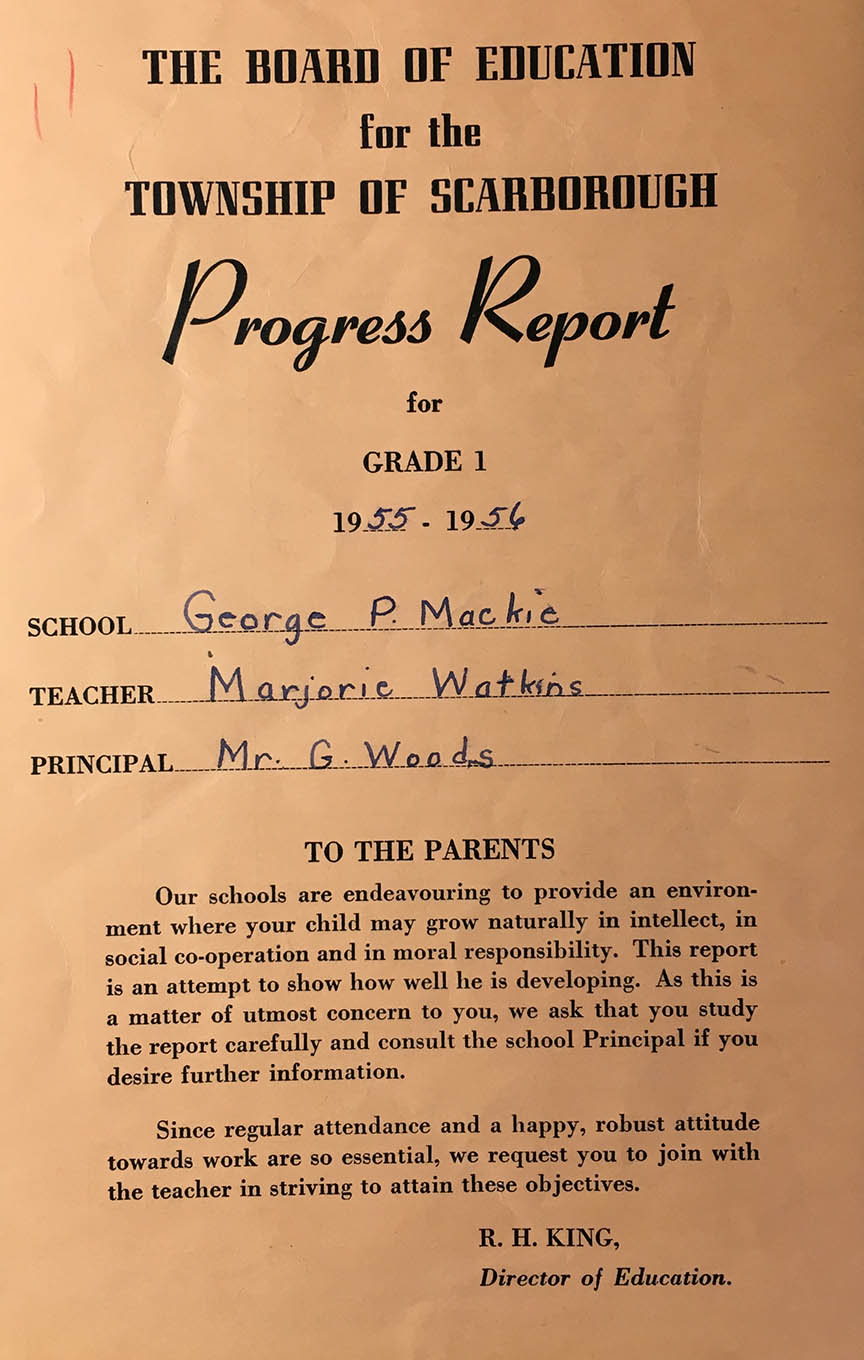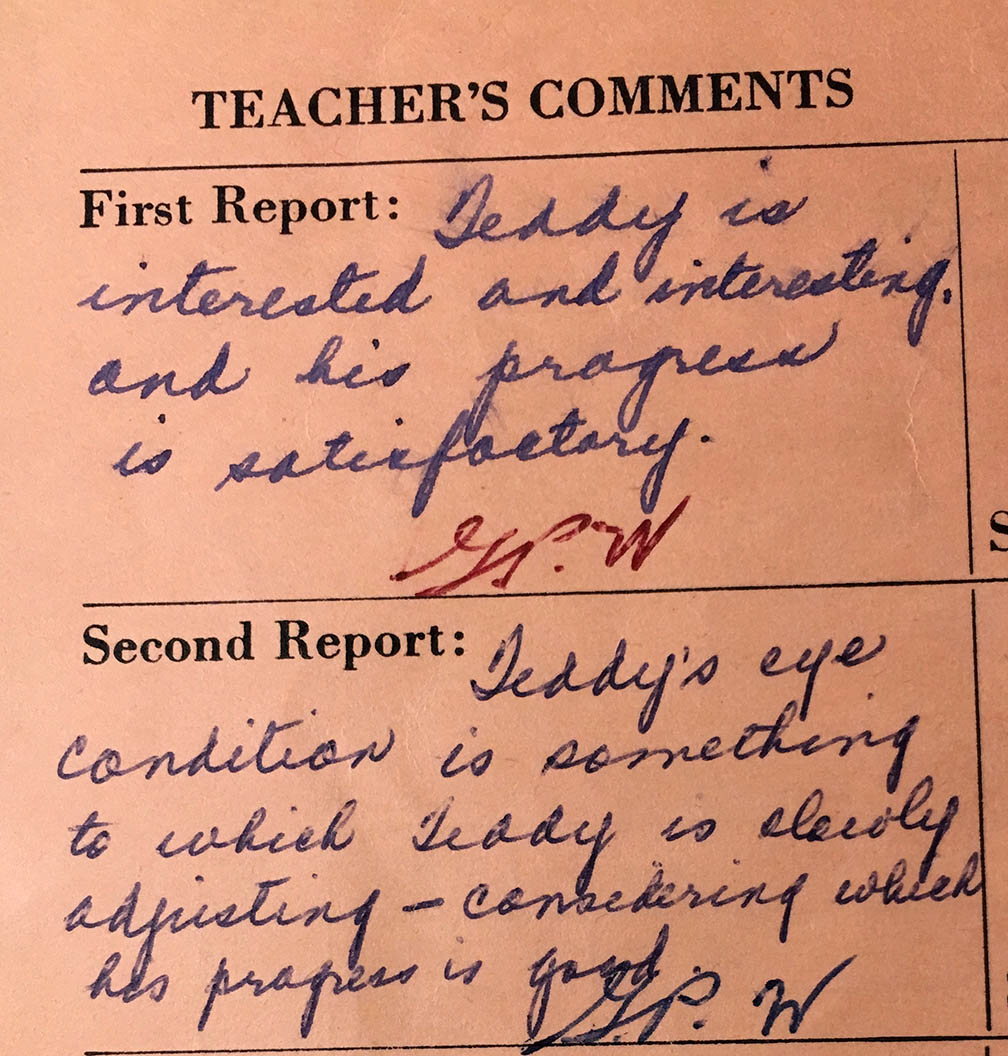
I don’t remember my very first day at George P. Mackie Public School, just off Kingston Road in Scarborough. But my parents would probably have remembered. Soon after I entered Grade 1, my teacher, Ms. Watkins, sent a note home for my parents.
“Why is Ted squinting?” she asked in the note. “I moved him to the front of the class, but I don’t think that’s enough.”

It was clear to Marjorie Watkins that I couldn’t see the blackboard properly. So, she and my mother arranged for an eye examination and I began a lifetime of wearing glasses (and of taking the taunts from some of my classmates).

In addition to the story of the note, I still have my Grade 1 report card with Marjorie Watkins’ remarks on my progress that year, 1955-56. As I review it 63 years later, I realize just how perceptive and gifted she was as my earliest educator.
In the wake of the cuts the Progressive Conservative government has planned for Ontario’s public schools, I thought I’d offer a few lines to thank Ms. Watkins and the generations of teachers since – from Kindergarten to Grade 12 – for their skill and guidance to students.
It was about four years after I began wearing glasses that I met Mike Malott at North Agincourt Public School. As my Grade 5 teacher, and the first male instructor in my life, he had a bit of an edge to him. Maybe that’s because he also coached our elementary school baseball, soccer and hockey teams; most of his teaching spurred us to aspire higher, look further and work collectively.
In history class – though it wasn’t on the curriculum – he re-enacted the Dieppe raid of 1942. He had researched the stories of its Canadian participants and made them come to life in the classroom as if he were their reincarnation.
“To the teacher in my life who instilled a passion for the past and the stories of Canadian veterans,” I wrote in dedication to Mike in my 13th book in 2005. And in later years, before he died, he and I played oldtimers’ hockey together, the other passion we shared.
When I moved into post-secondary education, I attended Ryerson, then a polytechnical institute. In my academic and broadcast-journalism classes, I met scores of brilliant instructors: Robert Gardner, who taught script writing, Mauri Desourdy, who taught announcing, Christina Macbeth, who taught advertising, Alan Small, who taught radio production, and Syd Perlmutter who taught TV production.
They were tough, but if we rose to the challenge, they bent over backwards to give us the skills to survive in the industry.
“The past is history, the future is a mystery, and the present is a gift,” Syd always used to say. Every day, he and his fellow instructors gave us the gift of their knowledge. And if we returned the favour with enthusiasm and dedication to meeting deadlines, budgets and their high standards of quality production, they put us on the air and into production to compete with “the big guys” – CBC, CTV, Global and the major post houses.
Over a decade ago, our older daughter chose to pursue a teaching career; she has taught the middle grades of elementary school in the area since then. And I’ve watched her annual ritual, this time of year, preparing to make learning the best possible journey for her students.
One Remembrance Week, a few years ago, I had the opportunity to address her class. Every one of her students had read pamphlets and books on the subject I presented. Some had built models and dioramas representing the topic. And their questions clearly reflected the way she had motivated them to discover the stories of Canadian soldiers.
Despite such enriched learning experiences for public school students, Premier Ford has chosen to refer to them as “a bunch of pawns” in the ongoing negotiations for new teacher contracts. All of which has demoralized many friends and family who teach. If the province doesn’t have their back, who can teachers turn to but each other, the parents and their unions to fight the cuts?

After my Grade 1 teacher, Marjorie Watkins, spotted my vision problem in 1955, and then helped me adjust to wearing glasses, apparently, I made steady progress in class that year. In subsequent notes home to my parents on my report card, she noted that “Ted is clearly adjusting … and his progress is good.” So much so that I was promoted to Grade 2 with a “B.”
Most of us could have seen through the current Premier’s campaign promise that “no teachers will lose their jobs.” The loss of one in four jobs is more likely the reality next year.
My lone hope, however, is that the Conservative model will spare enough teachers with the skill and vision of a Ms. Watkins to steer our children to success in spite of the government’s shortsighted view of public education.